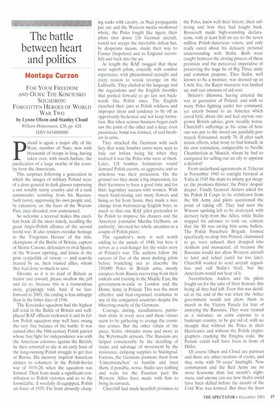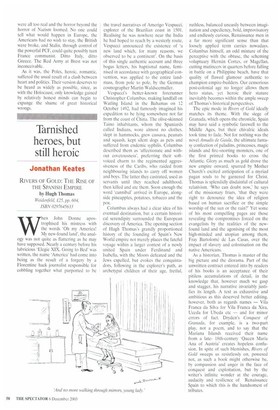The battle between heart and politics
Montagu Curzon
FOR YOUR FREEDOM AND OURS: THE KOSCIUSKO SQUADRON: FORGOTTEN HEROES OF WORLD WAR TWO by Lynne Olson and Stanley Cloud William Heinemann, £20, pp. 428, ISBN 0434008680 poland is again a major ally of the West, member of Nato, now with thousands of troops in Iraq, having taken over, with much fanfare, the pacification of a large swathe of the country from the Americans.
This surprises following a generation in which the images of military Poland were of a dour general in dark glasses repressing a not notably sunny country and of a tank commander scowling from his Russianbuilt turret, oppressing his own people and, by extension, us: the faces of the Warsaw Pact, once dreaded, now unmourned.
So welcome a reversal makes this excellent book all the more timely, recalling the great Anglo-Polish alliance of the second world war. It also renders overdue homage to the 'Forgotten Heroes' of the title, champions of the Battle of Britain, captors of Monte Cassino, defenders to rival Sparta of the Warsaw uprising, and losers in the grim realpolitik of victory — and scurvily treated by us, their trusted allies, whom they had done so much to save.
Irksome as it is to read of Britain as traitor and coward, please swallow the pill and do so, because this is a tremendous story, grippingly told. And, if we fastforward to 2003, the ending is less unhappy than in the bitter days of 1946.
The Kosciusko squadron had the highest kill total in the Battle of Britain and wellplaced RAF officers reckoned it and its fellow Polish squadron may well have swung the very fine balance of the battle. It was named after the 18th-century Polish patriot whose first fight for independence was with the American colonists against the British; he then returned to die in an early bout of the long-running Polish struggle to get free of Russia. His memory inspired American airmen to volunteer in the Polish-Soviet war of 1919-20, when the squadron was formed. Their feats made a significant contribution to Polish victories and so to the formidable, if woefully ill-equipped, Polish air force of 1939. Far from absurdly charg
ing tanks with cavalry, as Nazi propaganda put out and the Western media swallowed whole, the Poles fought like tigers; their pilots shot down 126 German aircraft, would not accept the inevitable defeat but, by desperate means, made their way to France (hopeless) and to England (scornful) and back into the air.
At length the RAF twigged that these were superb pilots, crucially with combat experience, with phenomenal eyesight and every reason to wreak revenge on the Luftwaffe. They chafed at the language and the regulations and the English throttles that pushed forward to go fast not backwards like Polish ones. The English clenched their jaws at Polish wildness and improper dress and tendency to fly off as opportunity beckoned and not keep formation. But when serious business began each saw the point of the other and a deep, even passionate, bond was formed, of real brothers in arms.
They attacked the Germans with such fury that some bomber crews were seen to bale out before being hit when they realised it was the Poles who were at them. Later, US bomber formations would demand Polish escorts, so aggressive and so solicitous was their protection. On the ground too they made a big impression, for their keenness to have a good time and for their legendary success with women. With much band-kissing and many flowers and being so far from home, they made a nice change from buttoned-up English boys, so much so that one RAF pilot pretended to be Polish to improve his chances and the American journalist Martha Gellhorn, an authority, 'devoted her whole attention to a couple of Polish pilots'.
The squadron's story is well worth adding to the annals of 1940, but here it serves as a coat-hanger for the wider story of Poland's war. The authors follow the careers of five of the most dashing pilots before branching out to describe the 150,000 Poles in British arms, mostly escapees from Russia recovering from their ordeals and training in the Middle East, the government-in-exile in London and the Home Army in Poland. This was the most effective and best-organised resistance in any of the conquered countries despite the blistering cruelty of the Germans.
Courage, daring, steadfastness, patriotism shine in every area and these virtues seem to be gathering to avenge the countless crimes. But the other villain of the piece, Stalin, obtrudes more and more as the Wehrmacht retreats. The Russians are helped considerably by the derailing of trains and sabotage of movement by the resistance, delaying supplies to Stalingrad. Furious, the Germans promote them from `Untermenschen' to bandits and treat them, if possible, worse, Stalin says nothing and waits for the Faustian pact the Western Allies have made with him to bring its rewards.
Churchill had made heartfelt promises to the Poles, knew well their history, their suffering and how they had fought back. Roosevelt made high-sounding declarations, with at least half an eye to the seven million Polish-American voters, and only really cared about his delusory personal understanding with Stalin. Both were caught between the closing pincers of these promises and the perceived imperative of preserving the huge lie of Big Three unity and common purpose. Thus Stalin, well known to be a monster, was dressed up as Uncle Joe, the Katyn massacre was hushed up, and vast amounts of aid sent.
Britain's dilemma, having entered the war as guarantor of Poland, and with so many Poles fighting under her command, yet utterly bound to an America which cared little about this and had anyway out grown British advice, grew steadily worse.
Churchill's sufferings as his sense of honour was put to the sword are painfully por trayed. Exhausted, nearly 70, ill after such titanic efforts, what irony to find himself, in his own estimation, comparable to Neville Chamberlain at Munich, whom he had so castigated for selling out an ally to appease a dictator!
From underhand agreements at Teheran in November 1943 to outright betrayal at Yalta in 1945 the slope to infamy got steep er, the promises thinner, the Poles' despair deeper. Finally General Anders asked for his Polish II Corps to be withdrawn from the 8th Army and pilots questioned the point of taking off. They had seen the Warsaw uprising left to be destroyed, with derisory help from the Allies, while Stalin stopped his advance to look on, content that the SS was saving him some bullets.
The Polish Parachute Brigade, formed specifically to drop into Poland, clamoured to go, were refused, then dropped into Arnhem and massacred, all because the Russians would not allow Western aircraft to land and refuel (until far too late). Churchill wanted to send aircraft regardless and call Stalin's bluff, but the Americans would not hear of it, Nevertheless, Anders and the pilots fought on for the sake of their honour, this being all they had left. Even this was derid ed at the end of the war when the Attlee government would not allow them to march in the Victory Parade for fear of annoying the Russians. They were treated as a nuisance, an extra expense to a bankrupt country, to be got rid of with no thought that without the Poles in their Hurricanes and without the Polish crypto graphers cracking the Enigma code, the Parade could well have been in front of Hitler.
Of course Olsen and Cloud are partisan and there are other versions of events, and they write with 50 years' hindsight. Now communism and the Red Army are no more fearsome than last month's night mare, and anyone can see how Stalin could have been defied before the mould of the Cold War was formed. But then the fears were all too real and the horror beyond the horror of Nazism loomed. No one could tell what would happen in Europe, the Americans had no wish to stay, the British were broke, and Stalin, through control of the powerful PCF, could quite possibly turn France communist. Ditto Italy, ditto Greece. The Red Army at Brest was not inconceivable.
As it was, the Poles, heroic, romantic, suffered the usual result of a clash between heart and politics. Their version deserves to be heard as widely as possible, since, as with the Holocaust, only knowledge gained by relatively honest minds can begin to expunge the shame of great historical wrongs.



























































































 Previous page
Previous page